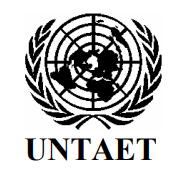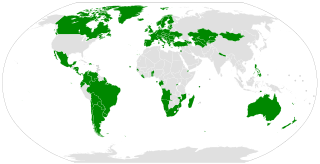Related Research Articles

Capital punishment, also called the death penalty, is the state-sanctioned killing of a person as a punishment for a crime. It has historically been used in almost every part of the world. Since the mid-19th century many countries have abolished or discontinued the practice. In 2022, the five countries that executed the most people were, in descending order, China, Iran, Saudi Arabia, Egypt, and the United States.

The United Nations Transitional Administration in East Timor, was a United Nations mission in East Timor that aimed to solve the decades-long East Timorese crisis in the area occupied by Indonesian military. UNTAET provided an interim civil administration and a peacekeeping mission in the territory of East Timor, from its establishment on 25 October 1999, until its independence on 20 May 2002, following the outcome of the East Timor Special Autonomy Referendum. The transitional administration was established by United Nations Security Council Resolution 1272 in 1999.

The economy of Timor-Leste is a low-income economy as ranked by the World Bank. It is placed 140th on the Human Development Index, indicating a medium level of human development. 20% of the population is unemployed, and 52.9% live on less than $1.25 a day. About half of the population is illiterate. At 27%, Timor-Leste's urbanisation rate is one of the lowest in the world.

The Timor-Leste Defence Force is the military of East Timor. The F-FDTL was established in February 2001 and comprises two infantry battalions, small naval and air components and several supporting units.

The Timor Sea is a relatively shallow sea in the Indian Ocean bounded to the north by the island of Timor with Timor-Leste to the north, Indonesia to the northwest, Arafura Sea to the east, and to the south by Australia. The Sunda Trench marks the deepest point of the Timor Sea with a depth of more than 3300 metres, separating the continents of Oceania in the southeast and Asia to the northwest and north. The Timor sea is prone to earthquakes and tsunamis north of the Sunda Trench, due to its location on the Ring of Fire as well as volcanic activity and can experience major cyclones, due to the proximity from the Equator.

Capital punishment in Sweden was last used in 1910, though it remained a legal sentence for at least some crimes until 1973. It is now outlawed by the Swedish Constitution, which states that capital punishment, corporal punishment, and torture are strictly prohibited. At the time of the abolition of the death penalty in Sweden, the legal method of execution was beheading. It was one of the last states in Europe to abolish the death penalty.

The National Police of Timor-Leste or PNTL is the national police force of Timor-Leste.

The Second Optional Protocol to the International Covenant on Civil and Political Rights, aiming at the abolition of the death penalty, is a subsidiary agreement to the International Covenant on Civil and Political Rights. It was created on 15 December 1989 and entered into force on 11 July 1991. As of December 2024, the Optional Protocol has 92 state parties. The most recent country to ratify was Zambia, on 19 December 2024.
Capital punishment in Chile is legally sanctioned, albeit with significant limitations. Since its abolition for civilian offenses in 2001, its application has been restricted to military personnel convicted of war crimes and crimes against humanity committed during wartime. This places Chile among the seven countries globally that have abolished capital punishment solely for ordinary crimes.
Capital punishment is a legal penalty in El Salvador. It was abolished in 1983 by Article 27 of the constitution, with an exception allowed for crimes committed under military law during a state of international war. Because of this, El Salvador is one of seven countries considered "Abolitionist for Ordinary Crimes," along with Brazil, Burkina Faso, Chile, Guatemala, Israel, and Peru. El Salvador last carried out an execution in 1973.
Capital punishment is a legal penalty in Grenada. Despite its legality, there have been no executions since 1978. Grenada is considered "abolitionist in practice", and is currently the only country in the Americas in this category. There is currently one person on death row in Grenada, as of August 30, 2021. During its United Nations Universal Periodic Review on January 27, 2020, Grenada informed the UN that it was a de facto abolitionist state with a de facto moratorium in effect since 1978, and that it would not carry out any executions. Abolishing capital punishment in law was part of one of the amendments during the failed 2016 Grenadian constitutional referendum. Grenada voted against the United Nations moratorium on the death penalty in 2007, 2008, 2010, 2012, 2014, 2016, 2018, and most recently, in 2020. Grenada is not a signatory to the Second Optional Protocol to the International Covenant on Civil and Political Rights.
Capital punishment has been abolished in Bolivia and is no longer a lawful punishment in the country. It was abolished for ordinary crimes in 1997, and for all crimes in 2009. Bolivia's last execution was of Melquiades Suxo on 30 August 1973.
Capital punishment has been abolished in Paraguay. It was abolished in the year 1992 by the constitution. The last execution was carried out in Paraguay in 1928.
Capital punishment was a legal penalty in Zambia until 2022. Despite its former legality, the country had not carried out any execution since 1997. Zambia was considered "Abolitionist in Practice".
Capital punishment was abolished in Burundi on 24 April 2009. Burundi is not a state party to the Second Optional Protocol to the International Covenant on Civil and Political Rights. The last legal execution in Burundi took place in 1997.
Capital punishment was abolished in Guinea. The civilian death penalty was abolished in 2016. It was abolished under military law in 2017. Guinea carried out its last execution in 2001. Prior to its abolition for ordinary crimes in 2016, Guinea was classified as retentionist.
Capital punishment was abolished in Namibia in 1990. The last execution was carried out in 1988, under the rule of South Africa.
Capital punishment was abolished in Senegal in 2004. The country carried out its last execution in 1967.
References
- ↑ "United Nations Treaty Collection". treaties.un.org.